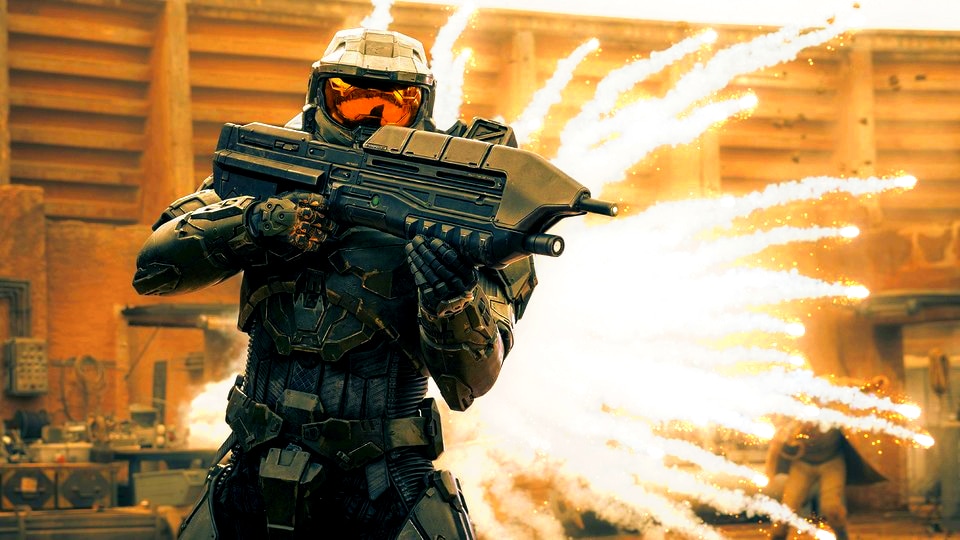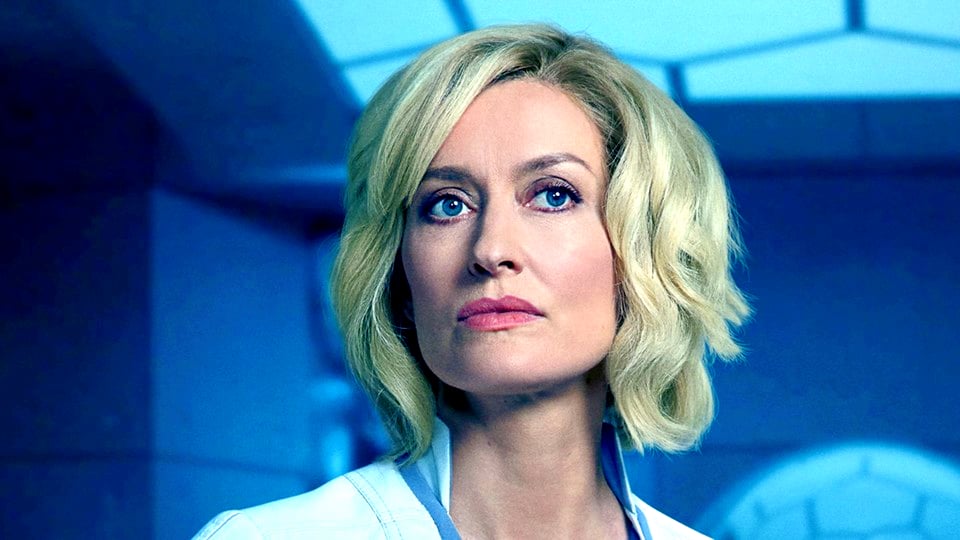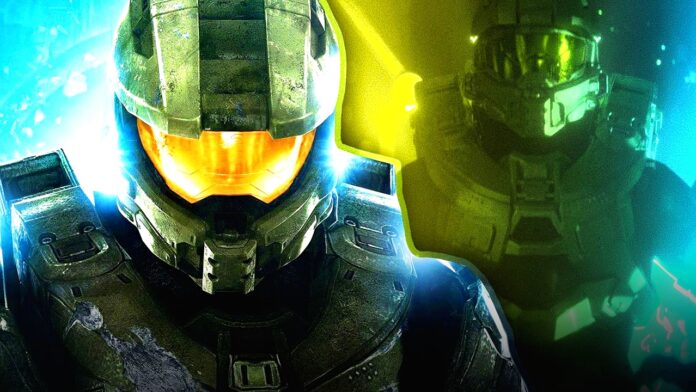After the first two episodes of Paramount’s TV series on Halo, our first series review stands: There’s a lot going on here chief.
The new Halo series is making me all nostalgic. It’s 2007, I’ve just come of age – and the film of Hitman is coming out in cinemas. Game adaptations already have a fantastic reputation back then, but I’m optimistic: Hitman really isn’t difficult to film. Let them use the story of Silent Assassin – a former assassin is forced by personal strokes of fate back into a life he has actually left behind. So it’s like … John Wick.
Of course, the final Hitman film was a disaster and had nothing in common with my idea. Or with the Hitman games in general. Yes, 47 stars, yes, he’s kind of maybe a clone, but aside from that, the film spins out some absurdly generic action baller that neither reaches new fans nor warms the hearts of old fans. Typical game adaptation, that is.
The first two episodes of Paramount’s new Halo series are the same. And yet somehow quite different.
Yikes? There’s a Halo series? If you haven’t heard about the Halo series and are wondering where you can watch it, here’s some framework data: Paramount has been given the green light to produce a Halo series. The first season has nine episodes, here you can watch the latest episode every Thursday via Sky Ticket – we have already seen the first two episodes. The Halo series is a reinterpretation of the original game, telling a completely different story in a new story universe. The Master Chief fights with his Silver Team on the planet Madrigal during the Alliance War against the Elites when he gets involved in the political machinations of the UNSC. The second season is already on order.
Table of Contents
More action please
A heads up to the spoiler police: to get my point across, I need to talk specifically about some scenes from the first two episodes. So if you want to watch Halo completely unaffected, come back next week to read my review.
But honestly, spoilers really don’t matter here, at least so far. Every aspect of the Halo series you’ve seen somewhere else in better. This series has its characters unironically saying lines like I don’t want revenge, I want justice! Or even better:
She: We’re all going to die!!!
He: Everybody dies sometime.
The “we’re all going to die” statement in particular has been used in dozens of top-class science fiction epics. But the Halo series at least manages to do the one thing that the Star Wars sequels manage to do superbly: It looks like the original.
From the Spartans’ Mjolnir armour to their assault rifles, Pelicans, UNSC uniforms and that dress-up wheel Spartans use to put on their armour – Paramount’s Halo series not only looks like Halo, it’s also by far the most beautiful Halo adaptation:
And when the Alliance elites actually fight the Spartans, the Halo series is at its best! The aliens are tangibly established as a threat, I’m really shown instead of just told why humanity has been losing this war for years.
Sure, the CG effects still can’t make two-metre tall alien dinosaurs look completely believable, but the technical leap to the 2014 series Halo: Nightfall is still gigantic!
Oh, if only the series would stick with it. Unfortunately, the first two episodes aren’t really about the battle between aliens and humans. Instead, the Halo series puts its foot in its mouth in the same way many modern series do: It wants to be too much like Game of Thrones.
Are we really the good guys?
Actually, the Halo series is doing exactly what I wanted Halo 4 through 6 to do in the GlobalESportNews podcast: It focuses on the darker side of the UNSC. Because the games merely hint that the Spartans are actually kidnapped and abused children and the oh-so-good human government is an oppressive regime. I have to read companion books and comics to explore this darker side of the Halo cosmos.
The Halo series focuses on exactly that, so in principle it strikes very, very exciting notes. But what it makes of it so far is as subterranean as a Flood cave. I never saw the controversial Star Trek Discovery, but I know the debate and see a very similar problem with Halo: The characters in that series either act like nonsensically evil comic book supervillains – or like immature teenagers.
The entire UNSC leadership presents itself as a bunch of incompetent egomaniacs who permanently ignore command structures, plot against each other, and even like to have children killed. The fact that anyone at all follows orders in this sap shop borders on a blood father miracle – and that is why there is no sense of gravitas at all when the Halo series has so far been mainly about disobeying orders.
Almost all the characters present themselves as one-dimensional clichés. There is, for example, in episode two, as in any sci-fi series, of course, a secret underworld asteroid led by a Lando Calrissian knock-off.
And of course, in episode one, there is a dubious, charismatic, militant rebel leader in a black leather coat who poses as a peacemaking saviour of his people in a television interview, but then, shockingly, turns out to be a murdering demagogue, of course.
The first Command & Conquer is now almost 30 years old – and even then Kane, with his black coat as a speech-making dictator in sheep’s clothing, was a cliché. Just a deliberately chosen one.
And what about the Master Chief?
Halo is oblivious to its own clichédness. In general, this series takes itself bitterly seriously, although the script really has to make an effort to push every plot into plausible channels.
In principle, there’s nothing wrong with portraying the UNSC as a chaotic terror regime, but the series has to explain to me why these people act in such a nonsensical way – and how they were able to survive for so long.

Halo’s story doesn’t feel like part of a believable world, it feels like a wooden theatrical performance where everything just happens because it’s in the script. I imagine the brainstorming process like this:
- Paramount Person 1: How do we plausibly explain the Master Chief suddenly questioning his actions after years of war?
- Paramount Person 2: We need an alien artefact that unlocks hidden memories! Real character development takes too long and costs too much money.
- Paramount-Person 3: And then we need a moral crossroads! Let’s force him to kill a child after all.
- Paramount Person 1: But why should the Master Chief be forced to shoot a child?
- Paramount-Person 2: Maybe he gets that as an order from above?
- Paramount-Person 3: Only why would someone give such a nonsensical order in the middle of an alien war?
- Paramount Person 2: It doesn’t matter. Just let Commander Keyes say that’s the way it has to be. That’s who the fans like. This is science fiction, basically anything goes.
- Paramount-Person 4: Maybe Emperor Palpatine will return somehow?
Ach, that’s right, the Master Chief plays the lead role in the Halo series, by the way. I always have to remind myself of this, because the giant super soldier usually only appears briefly before I have to watch some UNSC leaders being overwhelmed again for ages.
After his brilliant action appearance in the first episode, the chief is mainly busy standing or sitting in rooms so that other people can tell him something, or transporting people from A to B so that other people can tell him something there while he stands or sits.
Good, here at least the series stays true to the game. By the way, the chief regularly takes off his helmet, but that doesn’t make much difference because Pablo Schreiber’s facial expressions have as many corners as a Halo ring. This is not because of him – he can act – but because of the sparse lines of dialogue he gets to work with.
But enough grumbling, I already feel like the nagging pilot from Halo Infinite here. Let’s talk about another highlight instead.
Suspenseful questions for the future
Dr. Catherine Halsey is the most exciting character in the whole Halo universe in my eyes. It’s a shame she only appears sporadically in the games, because the inventor of the Spartan programme is a wonderfully ambivalent person, a chimera of monster and mother figure.
On the one hand, a war criminal who kidnaps children and stops at absolutely nothing, but on the other hand, she strictly follows her own idea of morality and has loving feelings for all the Spartans she has created.

The Halo series is a chance to take a closer look at Halsey and her shady goings-on. And thankfully, it does just that. The first two episodes are still putting the pieces of the puzzle in place here, but Halsey’s story is the only story strand that motivates me to keep watching this series. Good, and the hope for more cool Spartan action against the Alliance, because there are at least a few hints here too that make me curious. But aside from that?
Who is this series for?
The Halo series already has to face the question of who it was made for and why. Die-hard Halo fans don’t really get anything here so far that the games and books can’t do better. No action scene in the world can ever top the feeling of single-handedly dismembering two Scarabs in the finale of Halo 3.
And also in terms of storytelling: in the books, the Master Chief builds up decades of friendly closeness with his Spartan companions Kelly, Fred, Linda and co. even though, or perhaps because, these kids all have heartbreaking traumas to deal with. In the Halo series, instead, I get completely new characters with the Silver team, who so far remain completely pale and interchangeable. Sure, that can change … but why does the Master Chief get a new team at all?
Yes, the showrunners haven’t played the games, but characters like Kelly, Fred and Linda can be found in wikis. It’s literally enough to google Master Chief best friend, man. That would have been such an opportunity!
Maybe the Halo series isn’t about people like me. Maybe it’s legitimately trying to attract a new audience to the Halo universe. But for that, the series desperately needs to get out of the generic sci-fi cliché box in the coming episodes. And give the UNSC leadership a few courses in personnel management.


